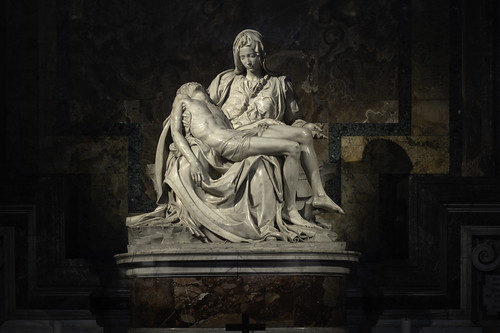During Easter, I had an epiphany. On Saturday morning ABC Classic FM played a charming melody that I had never heard before. I checked it out on “Recently Played” on my phone. It was entitled “Estampie, Stond wel, moder, under rode”. I thought, what language is that? So I looked further.
What I found just blew me away. It is English, 13th Century English. The first verse goes
“Stond wel, Moder, under rode,
Bihold thi child wyth glade mode;
Blythe, Moder, mittu ben.”
“Sune, quu may blithe stonden?
Hi se thin feet, hi se thin honden
Nayled to the harde tre.”
According to A Clerk of Oxford, this thirteenth-century poem imagines a dialogue between Mary and Christ as he hangs upon the cross. Meditation on the sorrows of Mary at the foot of the cross, as a way of imaginatively entering into the experience of the Crucifixion, was an increasingly popular devotional theme in this period.
“Stand well, Mother, under the rood, [cross]
Behold your child with a glad mood, [mind]
Joyful, Mother, you may be.”
“Son, how may I joyful stand?
I see your feet, I see your hands
Nailed to the hard tree.”
It was a similar experience to one I had in Rome. We had spent some time in Venice, where Mary Queen of Heaven paintings abound, and I experienced a degree of Protestant discomfort with this. Later, in Rome, we visited St Peters, where, quite unexpectedly, Michelangelo’s Pieta took my breath away.
My Easter epiphany was this: the Cult of Mary was not a pagan relic of a pre-Christian era. Rather, Mary is the saint of bereaved mothers. The infant mortality rate in the Middle Ages was around thirty percent (compared with one tenth of one percent today). Most women of child bearing age would have lost at least one child. Mary provided a Chistian context for this endemic grief.
Then came the Reformation. Because there were few references to Mary in the Bible, Protestants shunned the Cult of Mary. This denied an avenue of comfort for bereaved mothers.
I believe there was a grass-roots underground political reaction. It was a feminist counter-reformation among independent-minded women: the mid-wives, herbalists and brewers. They were sceptical about the new male-dominated religion and subtly challenged its authority. They were also generally illiterate which is why few records of this movement survive. This was a time of bitter religious wars and hatreds and these early feminists were caught in the cross-fire. On the basis of “He who is not with us is against us”, a propaganda compaign was mounted condemning them as “Devil worshipers” and they were rounded up and executed. History is the propaganda of the victors.
Witch hunts were a feature of Protestant Northern Europe. Catholic Southern Europe disdained such superstitious nonsense. Perhaps I have found the reason.



Hi John
I’m a practising Catholic, no doubt Our Lady’s role/position has been used in many ways for society’s ends, but in Catholic tradition she is the Mother of God, co redemptrix with Christ her son.
Regards
Doreen Hurst
Hi Doreen, I remember you and Doug from Canberra. I’m now living in Sydney, still waiting for my apartment to be completed. Life has deteriorated for all in the last 2-3+ years. I think that it is Tytler’s
cycle of democracy and we are in the stage of collapse.
What a great Statement:
“History is the propaganda of the Victors.”
Someone else said:
“What is history?
It is written in the books.
Who writes the books?
The Party writes the books.”
Viv
“History is the propaganda of the victors.”
Not always. We only have the Roman version of the loss of two legions to the Germans in the Teutoberg Forest in 7 AD. Perhaps history is the propaganda of the literate.
Right now I am in Munich and last week I was in the Reichstag building in Berlin, having brunch at the exclusive roof top restaurant Kafer (Beetle) attached to the distinctive glass dome. Next week I hope to visit Otzi the iceman across the Alps in Italy, and the week after back in Thailand.
At school we had a choice of learning French or German and I forewent German, and as it happens I spend more time here than France.
To be a better guest I have finally spent time this trip trying to increase my vocab, and the first thing I thought when I read the music title was that it sounded a little like German, or more like how I am badly pronouncing it at present, or perhaps a dialect like the Swabian or Bavarian I hear around me. So I am not surprised it is an early English.
The second thing I though was I have to check out Youtube, to hear what grabbed John’s attention.
And my third though was, how can I put some of my thoughts into a non-offending reply, which I have not worked out yet.
Easter is a big affair here. Four days almost entirely shut down commercially, like it used to be in Australia. And an equal mix of Catholic and Protestant. But they all use the same product logo, an execution machine with a dead body suspended.
There, I’ve done it.
Not to change the subject, but it was interesting to see that the Pope has rejected the Doctrine of Discovery, initiated by that most corrupt of all Popes Alexander VI to alternative ends, and I think my gut reaction to the music words was that this is again reinterpreting someone’s history, call it epiphany if you want, Admin’s in this case.
But I love the sentiment, a Mother’s poise at the death of her child.
They (we) are Anglo-Saxon. When I was a kid growing up in the Midlands in the 1940s there were still old people who said “thou bist” for “you are”.
Du bist always presenting interesting topics…
Found the music, Gothic. Too early Easter Monday here to play it loud yet.
Admin knows my ex partner but may not know she is quarter Danish and quarter German, growing up in the Huon in a German speaking household, and comprehends spoken Deutsche well.
Judy Ryan
I tried to post this. I don’t know if I succeeded or not.
https://www.al.com/opinion/2016/08/eight_stages_of_democracy.html
Very interesting Judy.
Like the entropy law of democracy, or the stages of grief, or the life cycle of a product.
There is surely a certain apathy I think at present. I worry about it. Democracy is a human invention, does not exist in nature, so is artificial and fights to exist at all I think. Maybe 200 years on average is a good result so far.
The family is a more natural structure which is why constitutional monarchies are more stable than democracies. Kings and queens are surrogate parents while the real power lies with the Prime Minister. A president is expected to be both a figurehead and a CEO. Trump was a competent CEO but lacked the dignity to be a good Head of State. Biden is the opposite.
“The family is a more natural structure which is why constitutional monarchies are more stable than democracies. Kings and queens are surrogate parents” whom we Love despite all their flaws, even when very serious, not inoften, which is how Charles and Camilla might become a great King and Queen, our knowing we know how human they are . . . and Loving them . . . as we love/loved our parents.
Interesting thought, people trust those who have mastered the challenges one faces. And Mary definitely has mastered the terrible death of her son.
Although child mortality has decreased dramatically (still births are dramatically increasing, though, since the beginning of mRNA vaccinations), the trauma is similarly widespread, due to the horrendeous number of abortions. My wife knows from her consultation work, that the Post Abortion Syndrom is similar to PTSD and remains for the rest of life. But we are not allowed to speak about it, because it is not supposed to exist. And there is no Mother Mary to turn to nor a pagan substitute.
Is it far-fetched to assume that such women in positions of power will lead their realm of responsibility onto a path of destruction?
And are we surprised to find so much superstition and esoteric groups?
Wow, consistent with the Holocaust, John’s idea that : “On the basis of “He who is not with us is against us”, a propaganda compaign was mounted condemning them as “Devil worshipers” and they were rounded up and executed. History is the propaganda of the victors.
Witch hunts were a feature of Protestant Northern Europe. “
Tellingly “consistent with the Holocaust” AND with the increasing madness of 3rd wave feminism, their having such Witch tragedy pedigree. How else to explain them?!?
Oh, John’s “independent-minded women: the mid-wives, herbalists and brewers . . . sceptical about the new male-dominated religion and subtly challenged its authority”. This was coming from that Northern Europe is as much Viking as Roman.
Scandinavian women are very “independent-minded” this way towards men.
Gosh, toxic masculinity on steroids, how Northern European Protestants treated their women. Firstly by depriving them of their “Mary . . . saint of bereaved mothers”, and then framing and burning their leaders as witches. Makes Trump look like an angel. Even Osama bin Laden . . . What Right have we got . . . did we have to go into Afghanistan to kill Taliban, not to mention . . .
I’ve long believed that Good and Bad are complementary via my teenage understanding of Zen Buddhism.
So my way of looking at John’s
“Reformation [in which] Protestants shunned the Cult of Mary [thus denying] an avenue of comfort for bereaved mothers [with] a grass-roots underground political reaction . . . a feminist counter-reformation among independent-minded women” as a consequence is that it may best be regarded as an example of, a consequence of extreme masculinism with this cruelty towards women, and towards Black, Brown and Yellow peoples globally, later, as a consequence, Collateral Damage. A Big Bad.
But also these Great Goods :
1.) The first of a series of Industrial Revolutions culminating in a Big Brother-ish AGI, Artificial General Intelligence.
2.) Science
3.) The first global empire, the Anglosphere’s now “ruling the waves”.
4.) The Romantic movement. Western music. Western art.
5.) Glamour, Western dress. The beauty of today’s Ice Skating competitions.
An “extreme masculinism with this cruelty towards women” as a consequence of Christianizing Scandinavia, the rest of us having had to match Viking “toxic masculinity” with our own imitation as the cost of so Christianizing them.ur women not knowing how to cope with this new challenge to them, their not being as independent-minded as Scandinavian women had learned to be, their having had to cope with their men finding nothing better to do for 100s of years than to build boats and go off . . . raping and pillaging . . . trading, and so on.
An “extreme masculinism with this cruelty towards women” as a consequence of Christianizing Scandinavia, the rest of us having had to match Viking “toxic masculinity” with our own imitation as the cost of so Christianizing them.
Our women did not know how to cope with this new challenge to them, their not being as independent-minded as Scandinavian women had learned to be, their having had to cope with men finding nothing better to do for 100s of years than build boats, and go off . . . being Vikings.